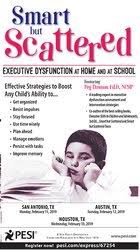Peg Dawson – Smart But Scattered
$219 Original price was: $219.$62Current price is: $62.
Shopping Instructions:
- DISCOUNT 15% : SHOP15
- Product Delivery: Within 1 – 12 hours after purchase.
Available for Pre-Order. This product will be available within a few days.
Peg Dawson – Smart But Scattered
- Executive Skills
- Underlying theory
- Executive skills in the context of brain function and child development
- Assessment of Executive Skills
- Parent/teacher/student interviews
- Behavior rating scales
- Observations
- Informal assessment
- Formal assessment
- Intervention Strategies
- Environmental modifications to reduce the impact of weak executive skills
- Teaching strategies to help children develop/improve executive functioning
- Using incentives to help practice or use skills that are difficult
- Keys to Effective Intervention Design
- Match the child’s developmental level
- Use the child’s innate drive for mastery and control
- Begin with environmental modifications
- Effortful tasks and ways to make them less difficult
- Use incentives to augment instruction
- Provide the minimum support necessary
- Apply supports and interventions until the child achieves mastery or success
- Gradually fade supports, supervision and incentives
- Coaching: An Effective Strategy for Building Executive Skills
- Description of 2-stage process
- Coaching with younger children
- Clinical case examples
- Research studies supporting the efficacy of coaching
Would you like to receive Peg Dawson – Smart But Scattered ?
Description:
Proven Strategies to Boost Any Child’s Ability to…
- Get organized
- Resist impulses
- Stay focused
- Use time wisely
- Plan ahead
- Manage emotions
- Persist with tasks
- Improve memory
Featuring Peg Dawson, Ed.D., NCSP, the leading expert in executive dysfunction assessment and intervention strategies co-author of the best-selling books, Executive Skills in Children and Adolescents, 2nd Ed. and Smart but Scattered
Children who have deficient executive skills often have trouble getting started on tasks, get distracted easily, lose papers or assignments and forget to hand in homework. They make careless mistakes, put off work until the last minute and have no sense of time urgency. Workspaces are disorganized and teachers often refer to their backpacks or lockers as “black holes.” Often considered chronic underachievers, these children are at risk for academic failure as well as emotional and behavioral difficulties.
Dr. Dawson, co-author of the best-selling books Executive Skills in Children and Adolescents, 2nd Ed. (Guilford, 2010) and Smart but Scattered (Guilford, 2009), uses case examples along with interactive discussion to demonstrate how the executive skills manifest in daily home and school activities. Learn how to assess these skills and take home evidence-based strategies to help children and adolescents overcome executive skills weaknesses.
End this seminar recording with a set of tools that includes strategies for task/environmental modifications, skill development through cognitive/behavioral techniques and creation of incentive systems. You will be able to give teachers and parents a means for developing and improving the following:
- organization
- time management
- impulse control
- goal-directed persistence
- executive skills critical for independent functioning
Related products
HEALTH & MEDICAL
HEALTH & MEDICAL
Gaia—Creating-High-Voltage-Health-with-Glenn-Streeter-Open-Minds
HEALTH & MEDICAL
HEALTH & MEDICAL
HEALTH & MEDICAL
HEALTH & MEDICAL
Dr Heidi M Crocker – Yoga Alignment | Speaker: Heidi Crocker EdD, DC
HEALTH & MEDICAL












